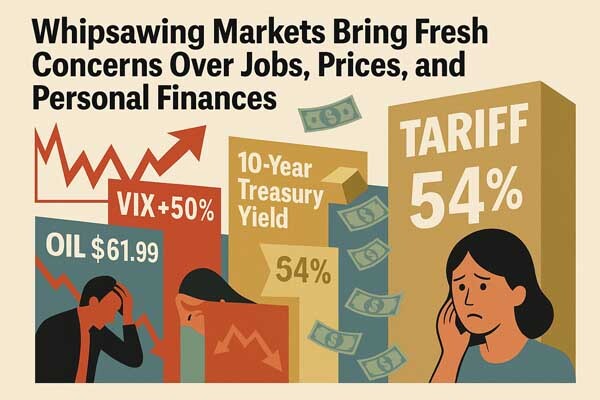 News Staff
News Staff![]() -
Apr 4 -
Business
S&P 500
Nasdaq Composite
Wall Street
Dow Jones
STOXX 600
Nikkei
-
760 views -
0 Comments -
0 Likes -
0 Reviews
-
Apr 4 -
Business
S&P 500
Nasdaq Composite
Wall Street
Dow Jones
STOXX 600
Nikkei
-
760 views -
0 Comments -
0 Likes -
0 Reviews

DLNews Biz:
Wall Street’s fear gauge, the Cboe Volatility Index (VIX), surged 50% in a wave of anxiety that analysts described as “extreme fear,” citing CNN’s Fear and Greed index plummeting to its lowest level this year. Investors rushed to shield themselves from escalating global trade tensions by selling stocks and buying government bonds, forcing the 10-year Treasury yield firmly below 4%. Because bond prices and yields move in opposite directions, that drop underscores how worried investors are about the possibility of an economic downturn. Gold prices also shot above $3,130 a troy ounce before settling around $3,030, reflecting renewed demand for safe havens.
Wall Street. Meanwhile, oil prices slumped out of concern that a trade war could dent global growth. US crude fell another 7.4% Friday to $61.99 a barrel after plunging nearly 7% on Thursday, its lowest level since 2021. International benchmark Brent dropped 6.5%, adding to fears that any global commerce slowdown could squeeze corporate profits and household budgets in the months ahead.
China announced sweeping 34% tariffs on all US goods starting April 10, intensifying a trade conflict that has already placed enormous pressure on businesses of all sizes. Earlier in the year, the US administration placed an additional 10% tariff on goods from China, then doubled that rate to 20%. This week, it unveiled plans to raise tariffs to 54%, layered on top of existing import taxes put in place by this and previous administrations. Markets slid worldwide as these announcements fueled uncertainty: the Russell 2000, which tracks smaller companies, entered a bear market, and Europe’s STOXX 600 and London’s FTSE 100 both posted their steepest one-day declines since 2020. Japan’s Nikkei 225 also sank for two days in a row, and in the United States, the Dow dropped more than 1,600 points while the S&P 500 fell nearly 5% and the Nasdaq nearly 6%.
“This is just the tip of the spear. Next it’s going to be retaliation from the EU and other nations. Banks, airlines and other service sector firms are going to get targeted,” said RSM’s Joe Brusuelas. “The Chinese are calling the administration’s bluff.” These concerns are hitting ordinary people at a delicate moment. If tariffs keep rising on consumer goods—from electronics to clothing—many households could feel a noticeable pinch, potentially raising everyday costs and hurting personal savings.
UBS lowered its year-end target for the S&P to 5,800 from 6,400, warning of a possible US recession. “In the near term, we believe the effective tariff rates could be higher still, and without the administration taking active steps to reduce tariffs over the next three to six months, we are likely to enter a downside scenario, including a meaningful US recession and lower equity markets,” said Solita Marcelli, chief investment officer for the Americas at UBS Global Wealth Management.
Some countries have opened negotiations with the United States, while others have already retaliated with new trade barriers. Canada, for example, announced fresh tariffs on certain US-made cars. France’s finance minister noted the European Union could target individual companies rather than impose broad reciprocal taxes on American goods, to avoid undermining the purchasing power of consumers in Europe.
Officials in Washington indicated they remain open to talks and gave the example of a potential agreement involving a major social media app in exchange for easing tariffs. But in describing stock market losses as “to be expected,” they also referred to the economy as being in a “transition period.” For everyday citizens, these upheavals in global trade and the roiling financial markets can impact investments, retirement accounts, and even food and energy costs. Heightened uncertainty can drive up prices on imported goods, reduce job stability, and discourage consumer spending, all of which weigh on personal wealth and living standards. Whether through more negotiations or a further escalation, the coming weeks will reveal whether this bout of market volatility stabilizes—or if even greater shocks lie ahead.

At Desert Local News, connections are everything. We're not just another social networking platform—we're a lively hub where people from all walks of life come together to share stories, spark ideas, and grow together. Here, creativity flourishes, communities grow stronger, and conversations spark global awareness.